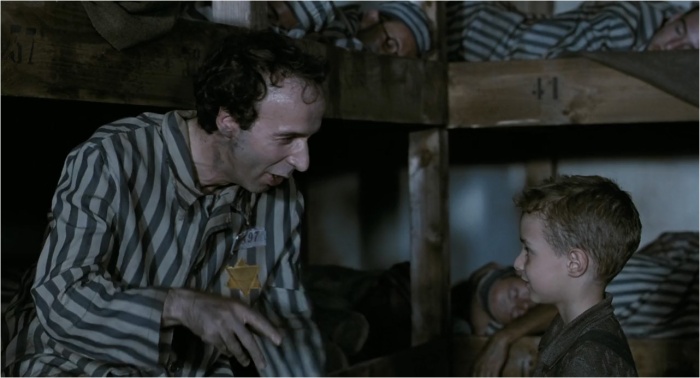 LIFE IS BEAUTIFUL, 1997
LIFE IS BEAUTIFUL, 1997
Movie Reviews
Directed by Roberto Benigni
Starring: Roberto Benigni, Nicoletta Braschi, Giorgio Cantarini, Giustino Durano, Sergio Bini Bustric, Marisa Paredes
Review by Stefan Leverton
SYNOPSIS:
A Jewish man has a wonderful romance with the help of his humour, but must use that same quality to protect his son in a Nazi death camp.
REVIEW:
Before the onset of plot summary, and technical analysis, I just want to try and convey the feeling I have for this film, without neither under or overstatement. On many levels people could acknowledge a certain aspect of the film and its surrounding press and come to unsatisfying conclusions. It may well be a war film, a holocaust film, more accurately. Therefore you may also deduce that it is tragic and dramatic. You may know a little more and understand it to be a comedy. Its an award winning foreign language film. However, the success and power of this film transcends all those things because when you are watching it, you are totally immersed in this wonderful tale. And how many films set amongst the backdrop of one of the most atrocious events the world has ever seen can say that?
Roberto Benigni’s masterpiece follows his charming character Guido, as he waltz’s, chaplinesque, into town to make his way in the world and subsequently try and win over the woman of his desires, Dora. I’m giving nothing away when I say he succeeds and they are happily in matrimony with a young son, Giosue, when the crux of the film really takes hold. That crux is the terrifying emergence of the Nazi Party and a wave of anti-Semitism which, unfortunately for the Jewish Guido and his Son, snares them into a concentration camp.
The film is really split into two, maybe three sections. The first being when guido arrives in the Tuscany town as somewhat of a chancer. The true nature of the film is veiled so heavily in humour, and Begnini’s performance is directly influenced by the silent stars of the early 20th century that all the dialogue could be removed, yet the plot could be easily understood as the whole experience is so animated. At this time Dora is already set to marry a local dignitary and the conclusion of the first part is Guido winning her affections in the most endearing, romantic and funny ways.
Throughout the first sections there is mention of the unsettled nature of Germany which is clearly starting to infiltrate Italy, its when we pick up the story five years later that we see the full extent of the Nazi’s influence and terror campaign. Guido and his family, now including five year old Giosue, are happily living with his uncle until Guido, of Jewish origin is arrested, along with his son. Guido being the man he is tries to keep the true horror from his young son by making out the trauma they are going through is a game. It is a situation of sweet sorrow and one that you can’t help but smile through the tears.
Benigni’s performance can’t be underestimated. His attempt to remain optimistic and portray their ordeal as some sort of game to his son, is on the one hand playful and full of humour. And on the other it is just heart-breaking. Never has a film made you laugh so hard and want to cry so much. The optimism the film promotes is inspiring. And around the truly great script and the unrivalled performance of Benigni is a consummate piece of filmmaking. No tricks are needed as the most important element is the story and how many films could learn from that, put the characters and the story first and the rest will follow.

Reblogged this on WILDsound Writing and Film Festival Review.
LikeLike